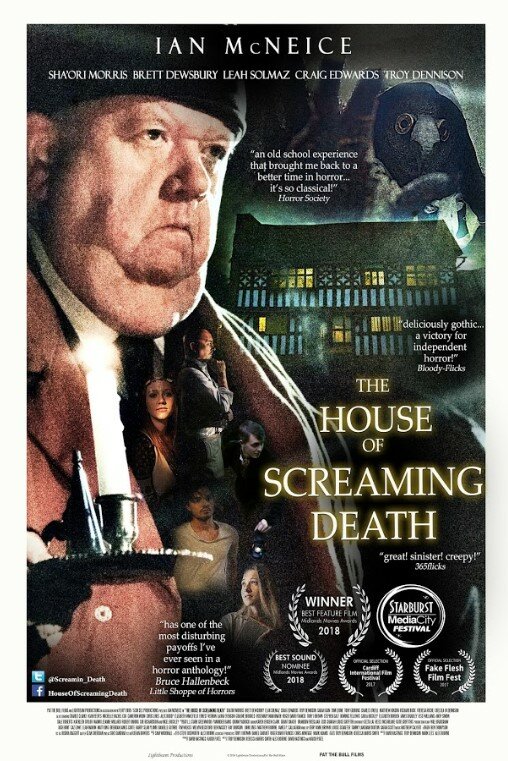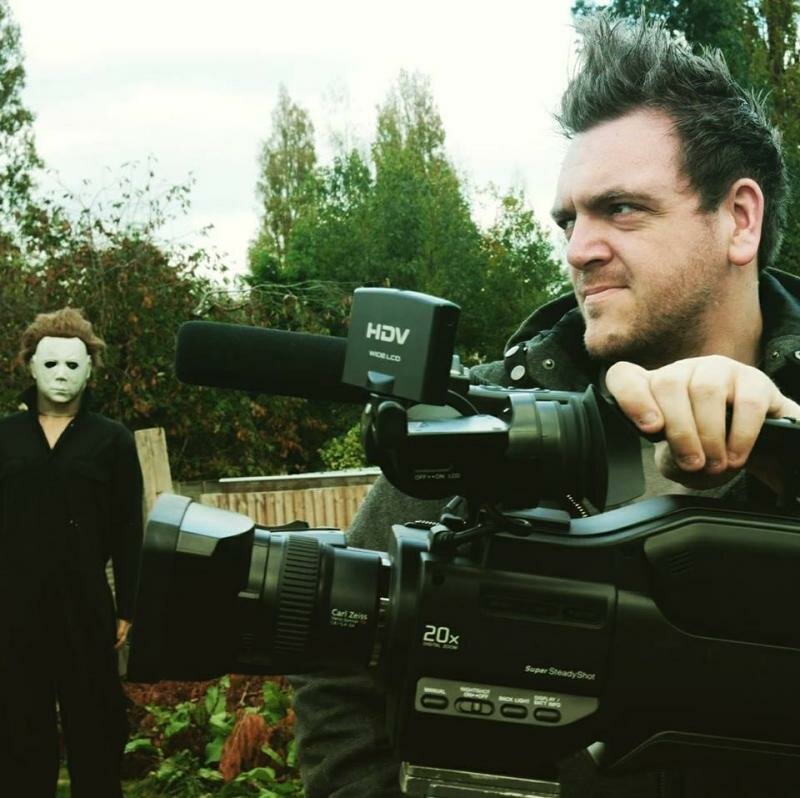
Born in Walsall, West Midlands, UK in October 1982, Dave Hastings was immediately captivated by films, and spent most of his youth digesting all types of them from varying genres. However, his favourite horror film is John Carpenter’s seminal classic, Halloween, for its “simplicity and raw themes of evil infecting everyday suburbia”. Carpenter’s film had a massive influence on Dave’s imagination when he first saw it at the age of six and encouraged him to pursue film-making from then on.
In 2007, Dave set up Lightbeam Productions, after studying Film Theory & Production at Manchester Metropolitan University to allow him an outlet to make movies as well as helping to showcase other local moviemakers and actors under one banner, which includes his long-time collaborator Kaush Patel, whom he has forged a strong alliance with for decades. After fully immersing himself in film-making from an early age, he has written, produced & directed a range of diverse and award winning movies over a variety of genre, to great and continual critical acclaim. He has won numerous awards and continues to keep busy producing, writing and directing, with many more projects on the horizon. Dave continually celebrates his parents, Sue and Ken, as his main inspiration for wanting to be a filmmaker.
Who or what was it that inspired you to become a filmmaker?
In terms of the ‘who’ in regards to your question, it was my folks, Sue and Ken who encouraged me to not only watch as many films as I could, but to read about them and ultimately encouraged me to make my own little movies. Every Friday night in particular during the 80’s and early 90’s, you could always guarantee something would be on the original four terrestrial channels, and it was either a Hammer film, or a classic horror on the BBC. If they weren’t, it was over to Channel 4 for some vintage Godzilla classic double bill. Of course, they were on late, so you’d have to spend 20 minutes programming the VCR timer to record them (kids today don’t know the horrors of that with their one-touch REC button on the Sky remote!). So, I’d be up early Saturday and Sunday mornings to see what delights I’d recorded (hoping it hadn’t overrun and cut off the ending of the film!). But yeah, all that initial exposure to films was from my folks, and I’m forever grateful to them, because my whole life since has revolved around them.
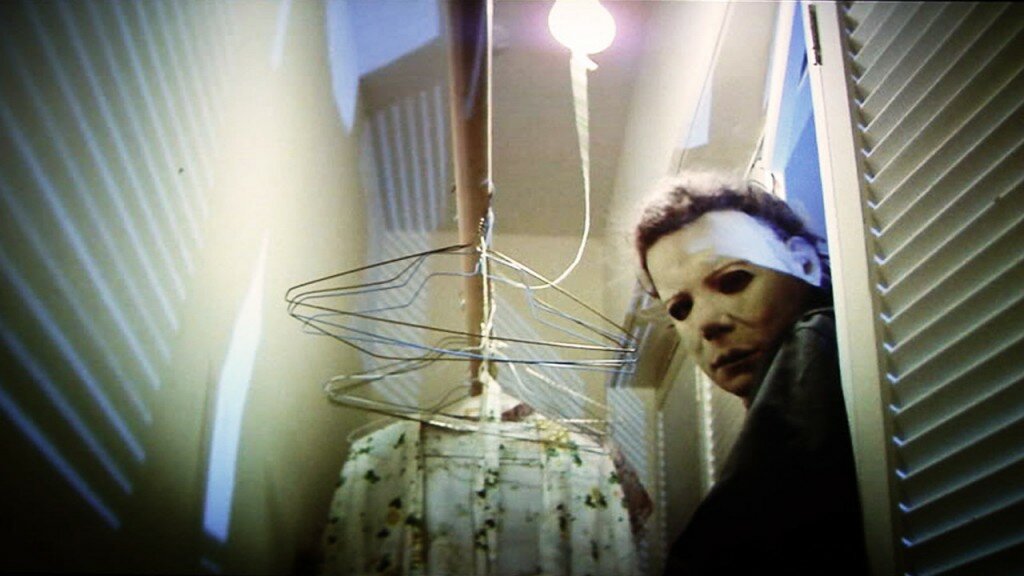
In terms of ‘what’, as mentioned above, I grew up on the classic British horrors from Hammer and Amicus. Peter Cushing was just wonderful, and I fondly remember his interpretations of both Baron Frankenstein as well as Van Helsing (sorry Hugh Jackman, Cushing IS Van Helsing!). Films such as Terror of Mechagodzilla as well as Destroy All Monsters and the rest delighted me from the Godzilla saga, and I was fascinated by these fantastic films, made in far-away Japan. And then there was John Carpenter’s Halloween. I first saw it when I was six years old (same age as young Michael Myers on his first killing spree, but I’m sane, I promise!), and was captivated. It was completely different to the gothic castles of Hammer, instead bringing horror into the real everyday world and it fascinated me that horror could suddenly be anywhere. So, my love of Horror grew from an early age and was uniquely delivered via my parent’s active encouragement.
But it wasn’t just horror, my folks encouraged me to watch films from every genre available at the Bentley Video Shop in Walsall (it was like a 2nd home to me in there!). We’d watch science fiction films (Beast from 20,000 Fathoms, The Day the Earth Stood Still), black and white films (Brief Encounter), foreign films (Cinema Paradiso), blockbuster films (Raiders of The Lost Ark, Ghostbusters), Oscar winning films (The Remains of The Day), and just everything else you could imagine, we tried to watch at every opportunity. I think my fondest memory, was my folks and grandparents buying me JAWS on VHS when I was recovering from a car accident as a kid. I had to have 6 weeks off school, and that tape was worn out pretty quick, from it being re-watched over and over while I was recuperating. I still have that VHS copy too. I kept a lot of my tapes. They are treasures to me, reminding me of this wonderful childhood I had with film.
Are there any filmmakers that influenced your approach or style?
There are two directors I absolutely adore, and they are both so very opposite from one another in terms of styles and narrative. On the one side, I adore David Lynch. He is just so out there and so bold, and instantly recognisable in terms of what he makes. An auteur if you will (although I’m sure he’d hate that term being coined to him). I remember watching Mulholland Drive at the Wolverhampton Lighthouse Cinema (support them folks, they are amazing and need everyone’s help at the moment!) I came out of that screening just having no clue what it was all about, but at the same time, it would not get out of my head. On top of that, Lynch is notorious about never explaining his films, so that adds a unique interactivity with them on another level.

Dir: David Lynch
Yet on the other side of that coin, and the filmmaker I draw from on a more visual sense in my own work for sure is Michael Mann. The man is a genius. His lighting, the framing in his films, the themes, oh they are all stunning and strangely beautiful on screen. For instance, I love how in Heat and Collateral, the city of LA is also a character and how it’s lit directly influences the characters and the plots. In Heat, the city is always blue, chilled, laid back, a calmness which reflects just how committed DeNiro and Pacino both are with what they do (the canteen scene is just stunning!), while in Collateral, yellow covers the city, making it feel sick/ill, as it’s being invaded by Vincent (Tom Cruise), temporarily for one night as he hunts down his prey.
I wanted to try this when we first started on Sustain with how I envisioned the look of our film. The places, the background, the feel of the film has a slight de-saturation and greyness to it. It feels off, and the characters respond to this similarly with their own lack of hope and sense of morality. It’s not a feel-good story and these visuals, I hope, will help us convey that further to future audiences of the movie.
A lot of folks think I’m weird for investing this amount of time to explore and try to understand these films on a deeper level, but by doing so, it has allowed me to find my own styles, employ my own themes to the films I make. Mann is one I follow very much technically and visually in that respect when telling my stories.
How have you found being a filmmaker in the West Midlands?
It’s my homeland so I always try and keep our own film-making within its borders. Sure, we nip out every now and again and film at locations further afield, because that’s always amazing too. But the films we’ve made so far, in reference to myself and producing partner Kaushy Patel, we always go first and foremost to places that are local and known to us. When we made Checking In, we approached numerous hotels in and around Walsall. And when we did eventually work with the Baron’s Court Hotel, it was lovely, because all the staff and the management there loved the fact we were like a family showing off local community spirit, talent and business.
We were all supporting one another, we were making a film there, all the publicity we had mentioned the hotel by name, so people who saw the finished movie knew about them, and the icing on the cake for us was seeing the hotel and the film highlighted on BBC Midlands News when it received its premiere.
Subsequently when we first started those very early days of House of Screaming Death, we went to all kinds of locations in the Midlands again, until we found The Manor House in Sandwell. The place got loads of press from the BBC, local newspapers etc. and it is something we always, always are adamant on pushing when we make these films. We highlight these local locations, because they are hidden gems, and we want the world to know there is more to UK film-making than just London, Manchester and Cardiff. Lots of amazing creative people who are just as exceptional in front of and behind the cameras here who deserve a chance to make their mark too.
How important is the writing process and how do you develop an idea?
I love writing. I love crafting worlds, and exploring characters, their motivations, their conflicts, what makes them tick so to speak. I’m also studying the world around me continually – picking up on news items, and I don’t mean the huge headlines, but those little stories you find hidden down the corners of newspapers, because those small ideas have so much potential to be wonderful future endeavours to write for. I’ve had one feature film idea rattling around in my head for a decade, a WWII drama that all came from a small article that ran for two sentences. But while I kept the main context of the story, I have also changed it, adapted it to a different time period, given it a new context as well as dangers that the characters will have to escape from. I cannot wait to evict that idea from my head onto paper someday in the future.
Consequentially, I’m determined to not limit myself to one genre too. I love horror of course, it’s been with me since childhood as I mentioned above, and it got me wanting to be a filmmaker, but I love branching out into other areas. I love pure drama, I love science fiction, I love thrillers, and historical stories. I remember while we were shooting Screaming Death, my very good friend and fantastic actor Thomas Loone asked me what I was thinking of doing next, and he was surprised when I immediately said, “not horror”. I explained that as much as I love Nosferatu-esque vampyres, ghosts, serial killers and so forth, I didn’t want to be pigeonholed with them every time. Of course, I’ll go back to them one day, and I’m already planning to, but I do like a break from the blood-sucking. That is why I loved the idea of Sustain, that monsters don’t have to be from gothic castles to be scary, they can be walking around society, every day in our streets. That’s more terrifying a notion to me.
You’ve made over twenty films across a twelve-year period. What have you learnt along the way and what are your highlights?
I’ve learnt that I can’t really do anything else! And that to have a social life must be amazing! Ha Ha! I think seriously though, till the day I die, film is just going to be with me in some way, shape or form. I tell my students why I love making films, and it’s because every single time you start on a new project, or walk onto a new set, it’s continually different and constantly evolving. You meet/interact with new people, you work with the latest technology, develop fresh ways of working with the cameras to tell your stories, while you visit new locations, exchange stories, challenge yourself by overcoming persistent obstacles in crazy creative ways, but most importantly, you make rich and lasting memories. If it wasn’t like this, I wouldn’t make films. Because it is fluid, it’s flexible, and those help me, continually evolve as a filmmaker. You’re always learning. Every project is different. If anyone ever says they know everything there is to know about filmmaking, they’re a rotten liar!
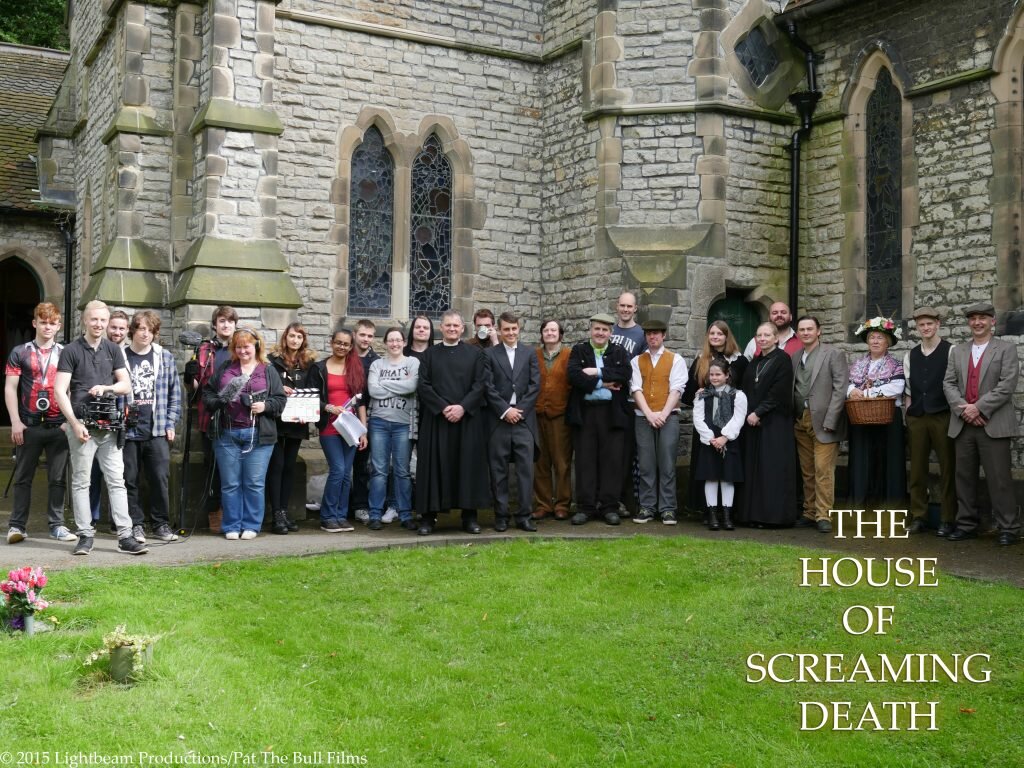
Highlight wise, there are so many moments where we’ve been on set and just laughed when things have gone into blooper mode, those moments are wonderful to experience. But I think, because we all come from a volunteering background, and because we all make these films within the confines of our own precious and valuable time, the varying ways the films have been given recognition is always a highlight. Because film is more than one person, and we all work together in so many amazing ways, with so much passion and determination. So, when we’ve won awards, or we’ve got some lovely and great reviews, that is just absolute gold to us all. That is the best highlight for me, that these wonderful people I continually work with and call my friends, are being recognised for their unique talents, both in front of and behind the camera.
You’ve worked collaboratively across two feature films, ‘Checking In’ and ‘House of Screaming Death’. How was that process of collaboration from a writing/directing perspective?
Oh, it’s been amazing! It’s so unique and fascinating to watch everyone else put their own stamp on the ideas and material within the anthologies. It’s like a massive and evolving family, and every time we work on something else, it just opens up, expands and welcomes in even more talented people.
Checking In was the first feature we all worked on really, and we were definitely learning there. In hindsight, I’m surprised we managed to pull it off! There were so many massive considerations to work with and factor in, such as filming in a fully functioning hotel with actual guests. Now remember, we had zero budget, and we were asking a major hotel chain to let us come in and shoot all these very different and wildly intricate story lines over long hours! That is what I love about Checking In, and our other films, people were willing to give us a chance. You can’t ask for better.
The process was the same for each of those films relatively speaking. Myself and Kaush sat down on Checking In, and devised the initial ideas for the five stories within the hotel. We then decided which ones him and I were going to write/direct and then we offered the other three out to friends we trusted, who then came onboard, wrote their scripts based on the spec we’d given with free reign to adapt/change and personalise in their own ways. Once they were delivered, I would then become script editor and begin the process of moulding them all together into one cohesive screenplay. This meant tinkering with the start and ends of each segment, allowing little events or characters to intertwine with those from other stories, just to give the film that extra bit of character, and give it a universal identity, so that while each segment could stand on its own, they didn’t feel out of place in the bigger picture.
House of Screaming Death began in the same way, and we actually began the process while in post-production on Checking In. Again, we came together and threw out ideas for potential stories. We all had one area of the supernatural we wanted to work with, so the vampire story for me was born from my love of Hammer and Amicus, while mixing it with Murnau’s classic Nosferatu for the look of our antagonist. Once again, we’d all go off and write our assigned scripts, and when they were all finalised, I then had to start stitching them together so that they weaved in and out of each other. For this to happen meant we needed a homage to the old anthologies and that was how The Architect character was eventually born and who was eventually embodied by the wonderful Ian McNiece, who was just stunning in the role.
The challenge for me with The Architect narrative was giving his story a payoff that would stun audiences. I rewatched so many of the old Amicus anthologies such as Dr. Terror, The Vault of Horror and Tales From the Crypt, all marvellous productions in their own rights, but all with very similar conclusions; that everyone is already dead and the twists involve purgatory. Now the original ending for The Architect was the same. We find out he is a supernatural crypt-keeper type figure, which is great, and it would have worked well with Ian in the role, but the audience would have expected that. If you know your British horrors, you’d be waiting for that, and the payoff would have been nulled. So I went away for a week, and thought up all kinds of ways to play with those expectations. How could we have a good, terrifying and unpredictable final twist that would shock audiences? And I think we’ve succeeded there, because one of the things people have repeatedly said most about the film, is that the ending was so shocking, and nasty, and yet felt right. That it still felt like a classic British Horror Anthology. So phew!
Your new film ‘Sustain’ is currently in post-production. Can you tell us a little about the film and what your plans are for distribution?
Like with the last two films, Sustain was kind of conceived while we were working on Screaming Death. I’d cast Brett Dewsbury in my Vampyre segment, and when we wrapped on the first block, he wanted to get some showreel material made. So, we conceived various ideas for some 2-3 minute standalone scenes, and he had one little idea revolving around a guy who finds out his half bother had been killed in a racially motivated attack. A one-off reaction scene really in context, but the more we chatted about it, the more we were starting to discover there was so much more to the idea, so much more story line and scenarios/characters to explore. So, I started writing the script, and Brett would send me scenes he’d conceive too, and I’d then try and adapt/incorporate them into the evolving script in some way, and before we knew it, the film had a finished script.
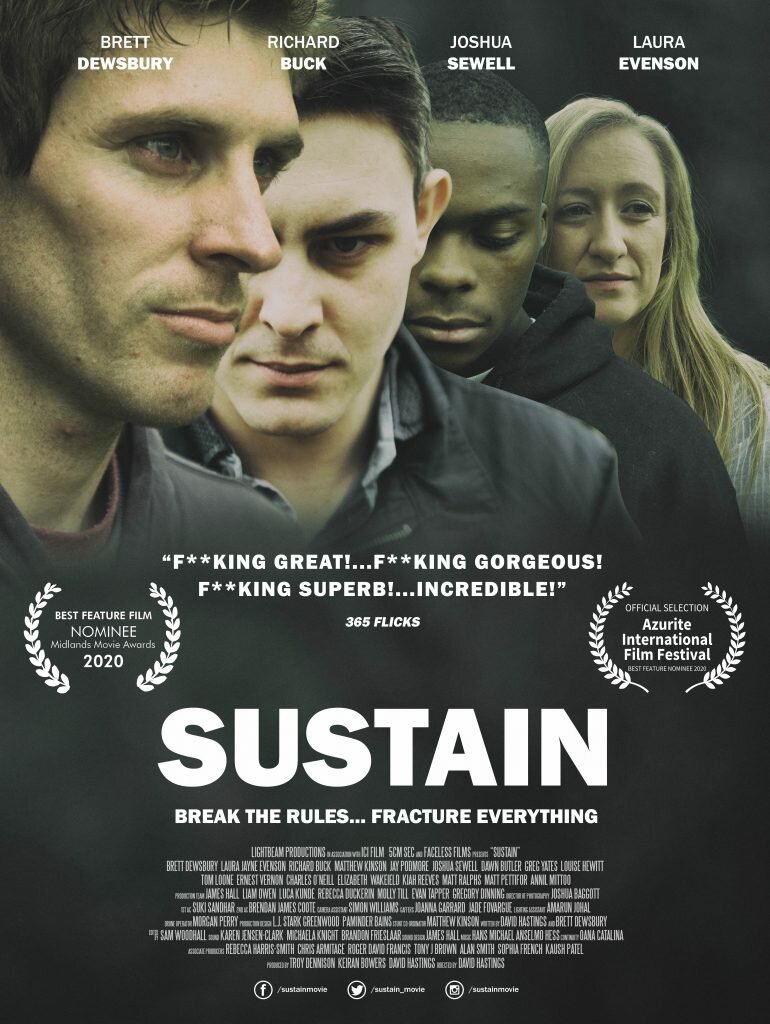
Going off what I said before, about doing different things, that was one of the main reasons I wanted to make this film from the very beginning. It was very different, and I wanted to be able to take on full directing duties to push and challenge myself further in that role. I asked Troy Dennison, Kieran Bowers and Kaushy to come onboard too, all taking on differing producer roles, while one of the other unsung heroes of our work (and she’ll hate me for doing this), is Sophia French, who works at Walsall Council. Sophia has been instrumental in helping us get locations for all these films so far, and her support, kindness and encouragement in just wanting to help us make these films has just been worth more than mere words could express. She is an absolute superstar and 40% of what Sustain looks like is down to her getting us permission to use certain locations such as Darlaston Green, where the main murder in the film takes place.
The plot of the film follows mild-mannered Kieran Flank (played by Brett too), whose life is ripped apart when his half-brother Toby (the awesome Joshua Sewell), is viciously murdered in a brutal race attack led by the psychotic Kevin McKenzie (the fantastic Richard Buck who is a proper softie in real life and nowhere near as evil as his character here, promise!) After initially placing his trust in the authorities to get justice done, Kieran soon finds himself having to delve into the darker side of his own personality and contemplate actions he never would have conceived before in order to bring his brother’s killers’ down on his own terms. But even when working alongside seasoned local reporter Kara Marshdale (the stunning Laura Evenson), the path towards absolution puts Kieran on a terrifying and unpredictable collision course with this group of sadistic thugs who hold no remorse – a journey that he may never come away from unscathed.
Sustain very much allowed me to homage and re-explore the work of one of Mann. I’m absolutely fascinated with how he makes films, they’re beautiful to look at and he allows the environments additionally to become characters. I really wanted to do that with Sustain, and allow all the locations we used in the Midlands, to have a similar feel and tone throughout. That they all became part of a character too. I spoke a lot with Joshua Baggott, my amazing DOP very early on in pre-production about how this world needs to be seen. How what happens to different characters is reflected by these environments. And I hope you can see that throughout, as the locations are very urban, cold almost, like our protagonists and antagonists who are all pushed into volatile and uncharted territories within. We also de-saturated the look a lot, to drain the colours out of the film, so that would hopefully complement the tone as well as mood of the characters.
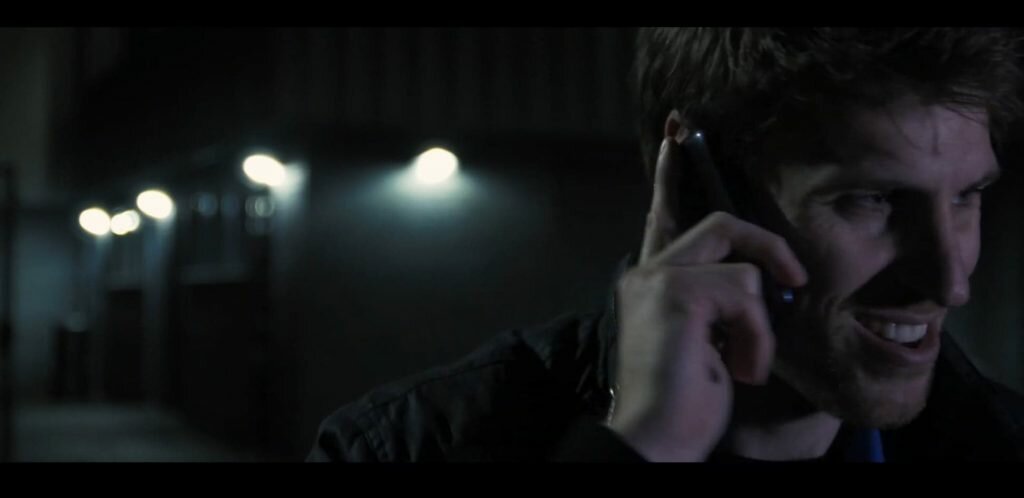
Additionally, it allowed me to play about with similar framing compositions that Mann (and Spielberg) employs, and this was such fun to do, especially with shallow focus techniques. When you see the film, one of my favourite scenes is when Kieran Flank (Brett), is called by Kevin. It’s a really intense scene and sets up the finale, that these two characters have to confront one another now. I really wanted to show how they embody completely different traits, that they are completely opposite to one another, the classic good and bad guy. But the temptation to go all out Mann in this scene was impossible for me to resist as well. So, we used the shallow focus technique and framed the guys very similarly but at either side of the screen (like Pacino in Heat, also on his phone), so that while they speak, the fear and gravity of this conversation could look visually beautiful. It also allowed us to unsettle the foundation of the spatial relationships both characters are in, in that moment.
By employing these techniques and throwing in our own homage to Mann and his films, I really hope it helps makes the scene even more tense and disconcerting. Now the film is complete, it’s already been up for Best Feature at this year’s Midlands Movies Awards, and it is also up for the same recommendation at the Azurite Film Festival. For it to have been nominated in the first two festivals we submitted it to is just an amazing feeling, and I’m just so happy for the cast and crew, because they all deserve it so much! It also allows us to shop it to potential distributors more with this validation from film festivals. Additionally the early reviews we’ve had have been very overwhelming, especially from the lads over at 365flicks, who just made my year with what they had to say in their review.
You wrote the script for ‘Borderland’, a new feature film that explores alleged accounts of Gay Concentration Camps set up in Chechnya. What were the difficulties in developing a script that tackles such a heavy subject matter?
I’m just getting to the end of the first draft. It’s pretty intense, but it has to be. You cannot shy away from these atrocities. Being from the community myself, I found the news at the time that this was all coming out just terrifying. And it still is happening! The fact there are people out there, who have the same sexual preferences, yet are being persecuted, kidnapped, tortured as well as some killed, is just horrific to have to think about in this day and age. I’m not sure why, but for this screenplay I wrote out a completely detailed treatment/storyline for it before writing. Usually I have a good idea of how I want a three act structure to work with a beginning-middle-end loosely pottering around in my head, but for this, I spent a lot of time working this plot out from the beginning. I think it’s because I’m writing it for my friend Ben Thompson, who is taking on the directing duties this time around. If I was directing, maybe I wouldn’t have gone through this process, but because I’m crafting it for Ben, I want it to be just right for him to interpret visually from page 1.
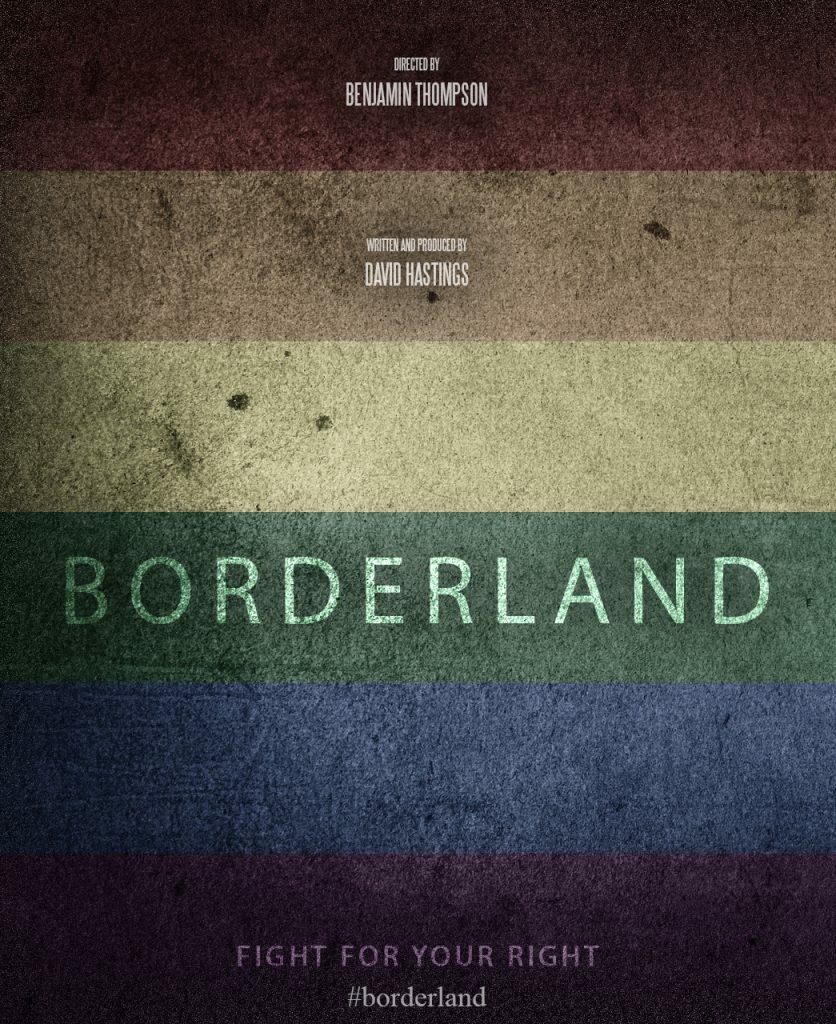
I’m very conscious of the narrative too and trying to write something that tells a story for those who are being persecuted and are going through absolute horrors completely unimaginable to the majority of us. To give them a voice when they have been denied one. The research I did was just shocking, and I’m not afraid to admit, brought me to tears on numerous occasions reading testimonials. But you channel that anger, that sadness as a writer and I’m trying my absolute best to honour them, to show them we are with them, even through art.
What do you most enjoy and least enjoy about the film-making process?
I love almost everything about it, even the pre-production meetings where we schedule shoots, look at and lock down locations. It’s all incredibly rewarding and as I said earlier, you’re just learning all the while. You meet all these wonderful people and just all of you come together to make something as best we can with the limited resources at our disposal.
What I don’t enjoy as much? Hmmmm, tough question, even the most stressful of times you can look back on with fond memories. Being able to use hindsight to place them into a context of “we can laugh about that now”. If I had to pick something though, never having enough hard drive space and the hiccups technology can bring us sometimes. They can give you lots of sleepless nights!
Is there anything you’d change about the film industry?
I wish it was easier to get help with funding. That’s a continual thorn in our sides. I look at films like The Mummy with Tom Cruise, and often say, 5 seconds of him running down a street probably costs more than we’ve ever had on one of our films alone. It’s frustrating because there is so much amazing talent in the independent film scene, and yet, trying to find any funding is like trying to find the lost ark with Dr Jones! Sometimes you get close to the prize, then it disappears again. Crowdfunding platforms have been a godsend, but again, that is so difficult to attain full funding if you’re not on them 24/7. So, if anyone is out there who wants to fund our films, and help support independent artists both in front of and behind the camera, get in touch. You won’t regret it! Pretty please!
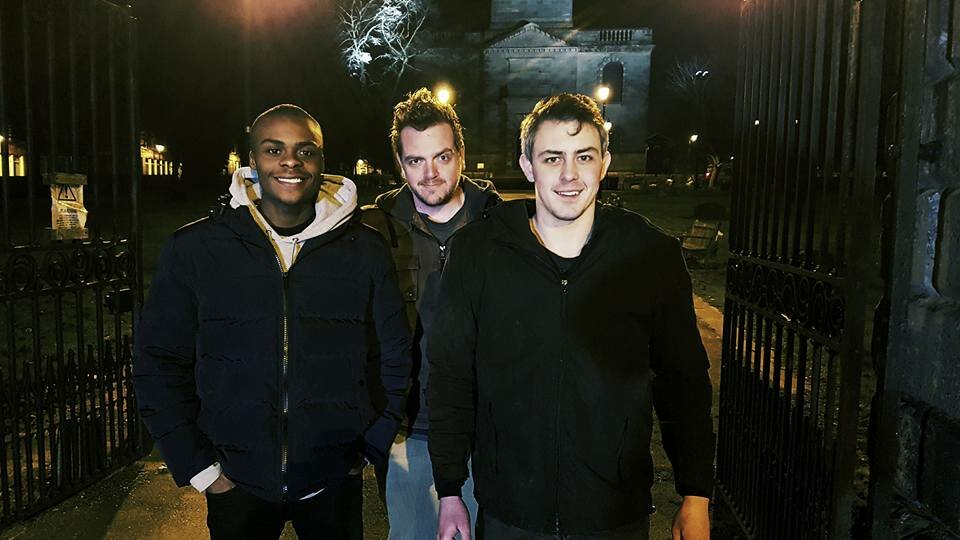
Joshua Sewell & Brett Dewsbury (Sustain)
What advice would you give to anyone starting out as a filmmaker?
Watch the world. Observe it. Every day is a new story. Full of new, exciting characters. So use your DSLRs, use your camera phones, get your friends together (after lockdown!), watch as many films as you can – good or bad, don’t care what critics say, you decide what is a good or bad movie! Go make fake blood with tomato sauce! Use Godzilla action figures to knock over the empty cereal boxes you’re using as mock buildings! Be passionate. And have fun! This is where your creativity and love for film will come from and it will stay with you forever.
What’s next for Dave Hastings?
Lots actually! I’m in post-production on my next feature, You Are My Sunshine, an LGBTQ love story, starring the wonderful Steve Salt, Jack Knight, Charles O’Neill, Ernest Vernon, Simon Bamford (from Hellraiser fame), and so many more amazing people! I’m really excited about it – again, it’s a complete tonal shift from the thriller genre seen in Sustain, so I was really excited to delve into the romance genre to challenge myself again and so far it looks beautiful, all because of the amazing cast and crew.
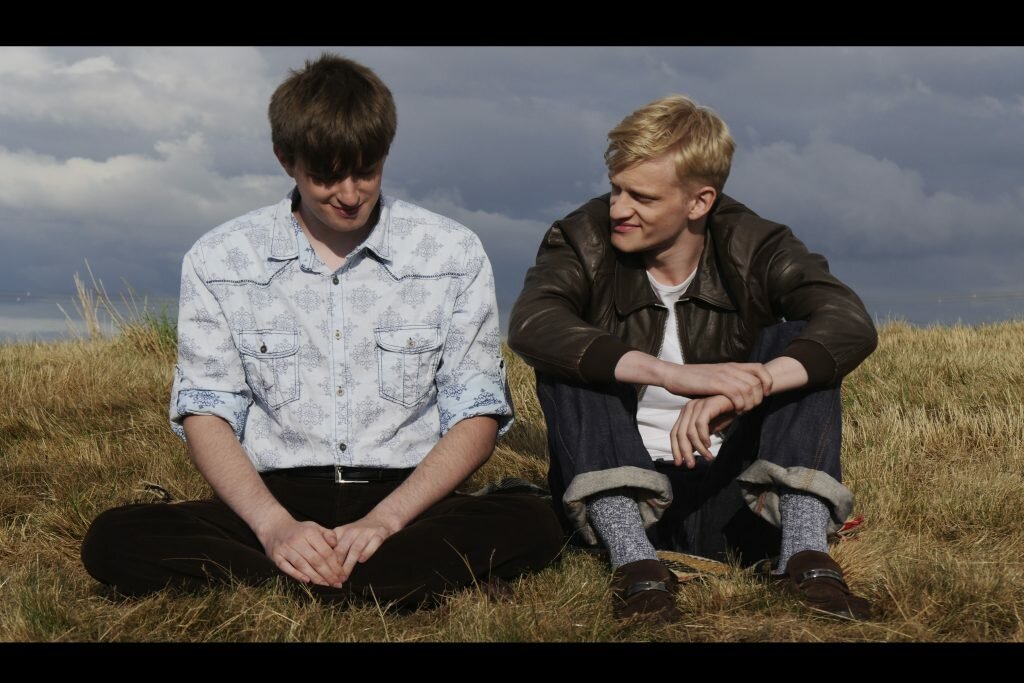
I’m also co-producing Advent with Kaush, which is our return to the anthology format, this time with the themes of Christmas running at full festivities, and we even managed to get the absolutely wonderful Arthur Bostrom into the film, who is one of my childhood heroes being the unforgettable and hilarious Officer Crabtree from Allo’ Allo’, so that has been a treat and we can’t wait to get back filming later this year.
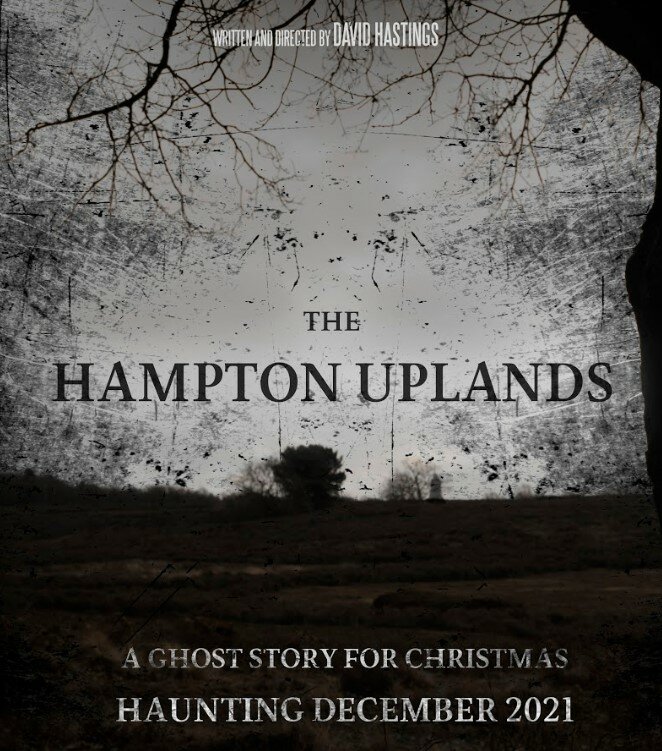
There’s the aforementioned Borderland of course, and I’m dipping back into short films again after that, first with Fray, which tackles the dark side of the boxing world and the medical condition known as CTE, and then there’s The Hampton Uplands, which is going to be my attempt to channel M.R. James territory by directing my own Ghost Story for Christmas. I love all those ones the BBC produced in the 1970s, such as The Stalls of Barchester, A Warning to the Curious and The Signalman, so I’m really excited to try and replicate their unique mise-en-scene with one very scary ghost and his unfortunate victim.
And then, and this is the first time I’m mentioning it I guess, but myself and Liam Banks from Superfreak Media have been dying to collaborate for years on a full horror slasher feature film, and after banging our collective heads together against the wall for a while now, throwing about ideas, we’ve come up with something pretty cool that we are starting to explore in more depth. So yeah, happy to announce that Spineless is coming and will be a throwback to the nostalgic 80’s slasher film with a very sinister killer with no motive whatsoever, but who can still manage to cause as much murderous mayhem as you’d expect.
Thank you so very much for asking me to be here. It’s been an absolute pleasure, and I wish every filmmaker out there the very best of success and to have as much fun as you can being all kinds of creative!

